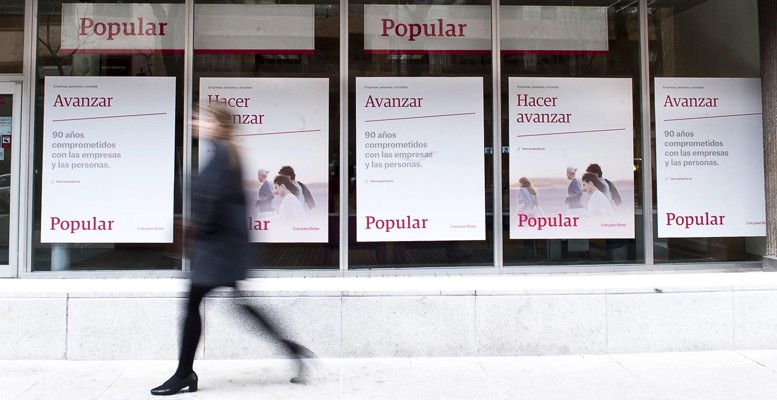For once, BBVA chairman’s words have been a kind of premonition. Last week, when he said rather desperately that “negative interest rates are killing us,” he was not referring to Popular. But the fact remains that a few days later, the bank with Angel Ron at the helm announced a capital hike for 2.5 billion euros, slightly less than half of its stock market value. The aim of the operation is to offset the impact of future regulatory requirements and the shortfall related to the “floor clauses,” calculated at nearly 4.7 billion euros.
Analysts were quick to issue a warning that almost double the amount of the planned capital increase would be required to meet additional regulatory demands or the possibility that Popular might have to reinforce coverage of its bad loans, currently standing at 40.2%, to bring this up to sector average in Spain of nearly 50.0%. So the move was interpreted as a way of gaining more time, which is no guarantee against another cash call in the future.
Banco Popular is the first in a list of banks which has decided to call on the market at a difficult time for the sector. This process will continue with other entities facing serious problems of profitability. Although they may not be able to count on the same support as “Popu” for obtaining the desired amount. With this additional capital it will be able to strengthen its balance sheet, speed up the sale of its toxic property assets and maintain its dividend, as well as start implement stringent cuts.
But even so, the banking sector has opened its dance card.
Although Popular is the Spanish bank with the most exposure to property and mortgage defaults, there are definitely a lot of lenders who are suffering from the harsh conditions imposed by the ECB up to now. The final outcome of these measures has been a decline in return on equity (ROE) – 4.4% in 2015 – while the cost of capital (COE) remains at 8%.
The negative rates applied to the ECB’s deposit facility since mid-2014 have eroded the performance of the banking business. But in 2016, they extended their impact by pushing the 12-month euribor into negative territory, something which has never happened before.
In reference to what is known as the ECB’s full monetary display, and faced with the difficulties and the anomalies created by this environment – with countries paying to issue debt or banks paying for liquidity – the financial institutions are trying to look for defence mechanisms which not all of them manage to implement. Popular is the first on the list to recognise this and is looking for capital.





